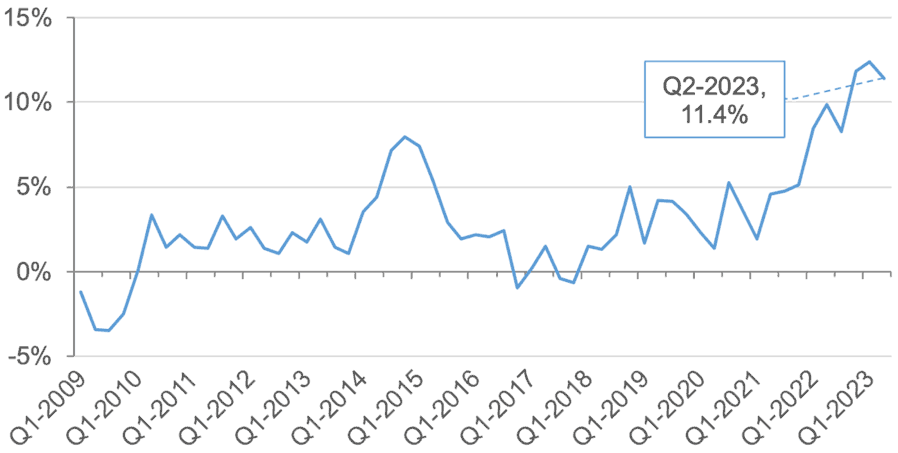Scottish Housing Market Review Q3 2023
Quarterly bulletin collating a range of previously published statistics on the latest trends in the Scottish housing market.
4. Private Rental Sector
4.1. Private Housing Rental Prices
Note: In previous editions of the Scottish Housing Market Review, the ONS Private Rental Sector index was used to monitor changes in the private rents. However, the methodology used for this index, in particular the assumptions which are made about the behaviour of rents paid by existing tenants due to limited data on actual trends in this sub-sector in Scotland, means that the behaviour of the index may not robustly capture the impact of the Cost of Living (Tenant Protection) Act on capping rents for existing tenants (see Section 4.2). Therefore the analysis in this section focuses on data from letting agents, which covers rents for new tenants, and is not affected by the emergency legislation.
Letting agencies only cover around half of the private rented sector, and each letting agent’s data will be affected by its market coverage, which will vary by geography and market segment. Subject to these caveats, data from Citylets, which showed an 11.4% annual increase in its Private Housing Rental Price Index in Q2 2023, and Rightmove, which recorded a 13.7% increase in its Rental Tracker, tell a similar story about recent trends in rents for new tenants in Scotland. Between 2010 and 2021, nominal growth in rents for new tenants, as measured by the Citylets index, had largely ranged between 0% and 5% (see Chart 4.1), before rental growth began to accelerate in 2022, nearly doubling from 5.2% in Q4 2021 to 9.9% in Q2 2022.

Source: Citylets
4.2. Rent Freeze and Evictions Moratorium
Tenants have increased protection from rent increases and evictions during the cost of living crisis under emergency legislation passed by the Scottish Parliament. The Cost of Living (Tenant Protection) (Scotland) Act 2022, which was passed by the Scottish Parliament in early October 2022, introduced a temporary rent cap, a temporary moratorium on the enforcement of evictions (except in a number of specified circumstances), and increased the level of damages for unlawful evictions to a maximum of 36 months’ worth of rent.
This cap, which applies to in-tenancy rent increases, was initially set at 0% for rent-increase notices served from 6 September 2022 until 31 March 2023. The cap has since been extended to 30 September 2023, with changes meaning that from 1 April 2023 if a private landlord serves a notice to increase a tenant’s rent mid-tenancy then the increase will be capped at 3%. Private landlords will alternatively be able to apply for a rent increase of up to 6% (previously 3%) to help cover certain increases in costs in defined and limited circumstances. Enforcement of evictions will continue to be paused for up to six months except in a number of specified circumstances.
The rent cap for student accommodation has been suspended, recognising its limited impact on annual rents set on the basis of an academic year, and the social sector rent cap was replaced with agreements with landlords to keep average rent increases for 2023-24 below the inflation rate at the time that rents for the coming year were set.
In September, the Scottish Parliament voted to approve regulations that will extend the remaining emergency measures for a further, and final, 6-month period to 31st March 2024 (at the latest).
Contact
Email: Bruce.Teubes@gov.scot
There is a problem
Thanks for your feedback